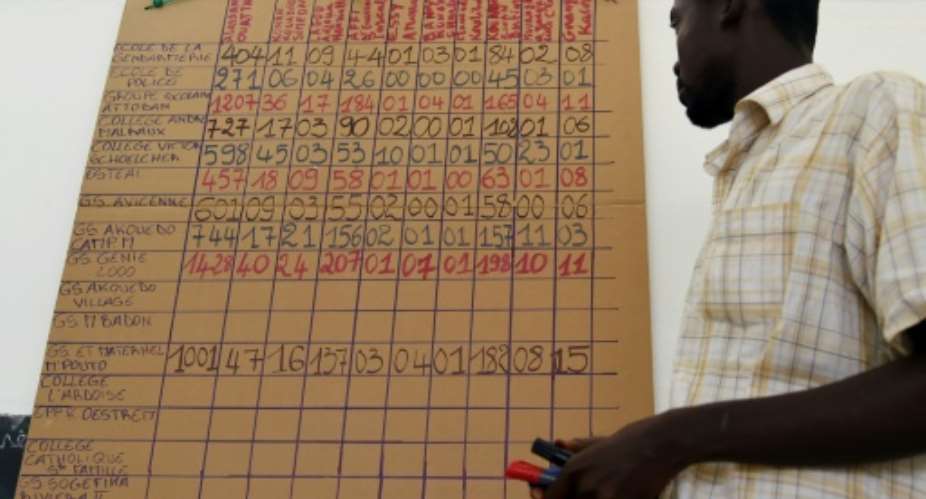Abidjan (AFP) - Ivory Coast's weekend presidential poll saw healthy turnout and won praise from observers as being fair, boosting the west African nation's bid to turn the page on a history of violence.
First estimates from the electoral commission put turnout at "around 60 percent", a reasonable level for a vote whose outcome was expected, with incumbent President Alassane Ouattara tipped to win.
"Ouattara needs to win with high voter participation to legitimise his presidency," Public Affairs Minister Cisse Ibrahim Bacongo had said ahead of the vote.
On Sunday, many polling stations opened late due to the delayed arrival of material and many computer tablets used to check voter IDs failed to work.
But there were no major problems reported and observers generally deemed the vote fair.
"The election will reflect the will of the people of Ivory Coast," said former Nigerian president Olusegun Obasanjo, who headed an observer team from the Economic Community of West African States (ECOWAS).
The turnout rate was lower than the almost 80 percent registered at the last presidential election in 2010.
But with some of the opposition calling for a boycott and three leading contenders pulling out, observers had expected it to be even lower.
In 2010, the election was highly charged, held as the country was split in two and after being postponed six times.
- 'It was transparent' -
African Union (AU) observers agreed that the election was properly run.
"From what we've seen, I believe we can, without the risk of making a mistake, conclude that it (the election) was well organised, that it was transparent," said Aminata Toure, the former Senegalese premier who headed the AU observer mission.
Results in the world's top cocoa producer are expected to be announced in the coming days.
The 2010 election unleashed months of violence in which some 3,000 people were killed.
The 2010-2011 crisis, which pitted Ouattara against former strongman Laurent Gbagbo, was the bloody epilogue to a decade of upheaval that had split the country between a rebel-held north and a loyalist south.
Violence erupted when then president Gbagbo refused to concede defeat to Ouattara, the declared winner.
A peaceful and credible election this time round was seen as crucial to help the west African nation recover its former status as a beacon of progress and prosperity in the region.
With the country now riding high on an economic boom and growth at around nine percent, Ouattara is hoping for a first-round victory over his six challengers.
A prominent economist and former deputy head of the International Monetary Fund, 73-year-old Ouattara campaigned on having turned around the economy and assured stability after years of turmoil in the former French colony of 23 million.
Gbagbo is now in a Dutch jail awaiting trial next month for crimes against humanity at the International Criminal Court in The Hague.
Ouattara's main challenger was former prime minister Pascal Affi N'Guessan, who ran on behalf of Gbagbo's party, the Ivorian Popular Front.





 Dumsor: Don't rush to demand timetable; the problem may be temporary — Atik Moha...
Dumsor: Don't rush to demand timetable; the problem may be temporary — Atik Moha...
 Space X Starlink’s satellite broadband approved in Ghana — NCA
Space X Starlink’s satellite broadband approved in Ghana — NCA
 2024 election will be decided on the grounds of the economy; choice of running m...
2024 election will be decided on the grounds of the economy; choice of running m...
 Dumsor: We're demanding less; just give us a timetable — Kwesi Pratt to ECG
Dumsor: We're demanding less; just give us a timetable — Kwesi Pratt to ECG
 Do I have to apologise for doing my security work, I won’t – Simon Osei-Mensah r...
Do I have to apologise for doing my security work, I won’t – Simon Osei-Mensah r...
 All my businesses have collapsed under Akufo-Addo — NDC Central regional chair
All my businesses have collapsed under Akufo-Addo — NDC Central regional chair
 Military, Prison Officers clash in Bawku, three injured
Military, Prison Officers clash in Bawku, three injured
 GRA-SML contract: MFWA files RTI request demanding KPMG report
GRA-SML contract: MFWA files RTI request demanding KPMG report
 Court threatens to call second accused to testify if NDC's Ofosu Ampofo fails to...
Court threatens to call second accused to testify if NDC's Ofosu Ampofo fails to...
 Family accuses hospital of medical negligence, extortion in death of 17-year-old...
Family accuses hospital of medical negligence, extortion in death of 17-year-old...
